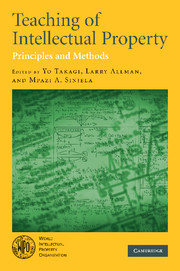Book contents
- Frontmatter
- Contents
- Notes on contributors
- List of abbreviations
- Table of figures
- Foreword
- 1 Recent trends and challenges in teaching intellectual property
- 2 Teaching patents
- 3 Teaching copyright and related rights
- 4 Teaching trademark law
- 5 Teaching industrial design law
- 6 Teaching intellectual property, unfair competition and anti-trust law
- 7 Teaching the economics of intellectual property rights in the global economy
- 8 Teaching intellectual property in a business school
- 9 Teaching IP practical skills for practitioners and attorneys
- 10 Teaching intellectual property to non-law students
- 11 Using the new technologies in teaching intellectual property (distance learning)
- 12 Teaching current trends and future developments in intellectual property
- Index
10 - Teaching intellectual property to non-law students
Published online by Cambridge University Press: 05 June 2012
- Frontmatter
- Contents
- Notes on contributors
- List of abbreviations
- Table of figures
- Foreword
- 1 Recent trends and challenges in teaching intellectual property
- 2 Teaching patents
- 3 Teaching copyright and related rights
- 4 Teaching trademark law
- 5 Teaching industrial design law
- 6 Teaching intellectual property, unfair competition and anti-trust law
- 7 Teaching the economics of intellectual property rights in the global economy
- 8 Teaching intellectual property in a business school
- 9 Teaching IP practical skills for practitioners and attorneys
- 10 Teaching intellectual property to non-law students
- 11 Using the new technologies in teaching intellectual property (distance learning)
- 12 Teaching current trends and future developments in intellectual property
- Index
Summary
Introduction and overview
Intellectual property (IP) is a timely and important topic for students graduating from institutions in developing or developed economies, in disciplines as diverse as biotechnology and fashion design. There is international demand for graduates able to capitalize on the knowledge they create. But there is no guarantee that intellectual property education will feature in the curricula of faculties other than law schools. In recent years, academics from across the disciplines have begun to consider the reluctance to teach IP beyond the law school, and to offer suggestions for developing curricula to include it.
Challenges in this subject
This chapter will explore some of the frequently asked questions that occur when academics start to think about including IP in the non-law curriculum.
Who is the audience for IP education?
Why teach IP to non-lawyers?
What does an IP syllabus cover?
How to teach IP to non-lawyers?
When is it best to teach IP?
Who can teach IP?
What if there is only one lecture allocated to IP?
Which resources should be used?
What does the future hold for IP teaching to non-law students?
Who is the audience for IP education?
IP education is relevant to students at all levels, and from all disciplines. Within the university community, it is important to achieve a level of IP awareness and competence among researchers, faculty members, administrators and technology transfer managers.
Information
- Type
- Chapter
- Information
- Teaching of Intellectual PropertyPrinciples and Methods, pp. 230 - 267Publisher: Cambridge University PressPrint publication year: 2008
Accessibility standard: Unknown
Why this information is here
This section outlines the accessibility features of this content - including support for screen readers, full keyboard navigation and high-contrast display options. This may not be relevant for you.Accessibility Information
- 2
- Cited by
